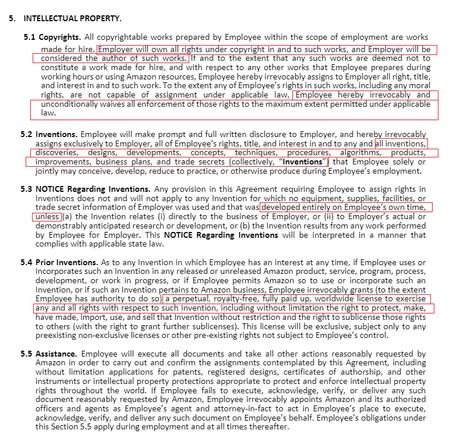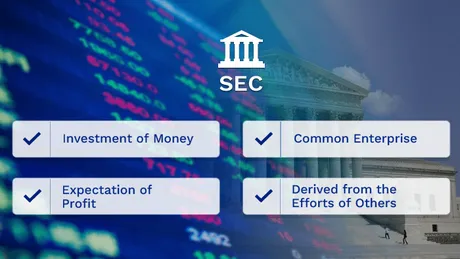
Law is a very difficult subject.
When we look at the language of law, it is always very confusing.

Here I saved the law-speak that many corporations have (in this case Amazon) that we sign away upon being hired: any right to inventions, ideas, or other intellectual property pertaining to the business. I first learned about this rule when watching the comedy show Silicon Valley on HBO. They are in court arguing this exact idea: that because the main character worked on his project for 5 minutes in the office, the corporation now owns all rights to a massively valuable project.
When I was watching this episode of Silicon Valley I was like, "There is no god damn way this is real." My girlfriend assured me that it was real, which was mindblowing, and then when I got the job at amazon I found it right there in the paperwork I needed to sign, which was even more mindblowing.
The reason why the law is so complicated is that lawyers never want it to be open to interpretation. Every edge case must be covered to avoid losing a battle, and the language is extremely precise and long-winded by design. It's no wonder why it costs $5000 just to declare bankruptcy. The paperwork and procedures alone are a daunting task to accomplish without the help of hired professionals.

Howey Test
The Howey Test is the result of a supreme court case from way back in the 1940's. It is essentially precedent that was set during that case to tell whether something was an "investment contract" or not. An "investment contract" is subject to securities regulations and the Securities Exchange Commission.
The definition of a security offering was established by the Supreme Court in a 1946 case called SEC v. W.J. Howey Co.
The reason why we hear about the Howey Test all the time is that regulators attempt to come down hard on crypto all the time. Is crypto an "investment contract"? Should crypto be subject to the Securities Exchange Act of 1934? In this post I skim the surface and try to draw conclusions using very limited research.
Obviously I'm not a lawyer so I really don't have a ton of authority when speaking on this matter, but I'm going to give it a whirl anyway. Perhaps one of the real lawyers on Hive will help me out in the comments.

- An investment of money, in a common enterprise, with the expectation of profit, derived from the efforts of others.
https://www.businessinsider.com/personal-finance/howey-test
Right off the bat we can see so so many red flags.
"Common Enterprise"
In a common enterprise… The term "common enterprise" was never explicitly defined by the Supreme Courts. However, it remains an important prong of this test.
Notice how most legalese speak is very complex and precise, but the Howey Test is the opposite of that; super vague and open to interpretation. That's because lawyers didn't get to write the test. Supreme court judges did. While lawyers hate vagueness, judges love it. The more open to interpretation laws are the more power judges have when enforcing them. Just look at the Amendments to the Constitution to see the ultimate example of this concept. Many of them are only a single sentence in length.
A well regulated Militia, being necessary to the security of a free State, the right of the people to keep and bear Arms, shall not be infringed.
lol wut?
“Common Enterprise” continued...
There are generally three ways to understand "common enterprise." The first, known as the horizontal approach, focuses on the idea that all the investors are putting their money toward the same enterprise. The second, called a vertical approach, is understood to be an investment where the success of the investors is linked to the success of the party that is being invested in. The last, known as the broad vertical approach, defines a common enterprise as an investment that hinges on a promoter or a third party's expertise.
Already we can see a massive amount of holes in the concept that crypto should be regulated by the SEC. Let's take Ripple Labs or Binance corporation as an example (because most would assume that XRP and BNB are obvious securities). Do we rely on Binance to pump the price of BNB? Do we rely on Ripple Labs to pump the price of XRP?
No, we don't, because there are a ton of random devs working on BSC worldwide. I don't know how many devs are working on XRP, but it's certainly more than just Ripple Labs. That alone completely destroys both the vertical approach and the broad vertical approach. The horizontal approach also fails because obviously all the money is not going to the same enterprise, as there are clearly multiple enterprises, especially on an EVM chain like BSC. Attempting to lump all crypto into a single enterprise would be ridiculous. Crypto is going to replace almost everything in 30 years.

"With the expectation of Profit"
The expectation of profit also completely fails for a reason that many in crypto are constantly harping about: utility. Not only does BNB have utility on the exchange side with reduced trading fees, but also the entire BSC network opens the doors for infinite utility to be built upon the asset by developers that aren't even associated with Binance.
Even @khaleelkazi has built a product on BSC. Kinda crazy when you think about it. What would happen if CUB went viral and then BNB spiked in value because of this viral "killer dapp"? It would further prove that in fact BNB is not a security. In fact, it doesn't even matter if it happens or not; all that matters is that it's possible, and we can make the argument that BNB is not a security.
Rule of thumb.
That being said, let's remind ourselves that this law is open to extreme interpretation. If we make a good argument against one of the prongs, that doesn't mean the judge is going to rule in our favor. We have to make the best case we can against all prongs in order to get the highest chance of victory in a case like this.
With expectations of a profit… This part of the test looks at an investor's intent for buying an asset. Are they engaging in a transaction because they're looking to turn a profit or are they, for example, trying to store wealth?
- What if they are buying BNB to get reduced trading fees on Binance?
- What if they are buying BNB to pool it against another asset on BSC to get yield on the other token?
- What if they are buying BNB to transfer value somewhere else and they want to capitalize on high liquidity and low fees?
- What if they are buying BNB to play a game not even created by Binance?
- What if they are buying BNB to mint NFTs?
- Insert XYZ utility here.
If a user bought BNB for any of these reasons, then the argument can easily be made that BNB is absolutely not a security because there was no expectation of profit. Again, many obviously do buy BNB because they want number to go up, but the devil is in the details. The edge cases matter. The more people buy BNB for these other utilitarian reasons, the more of an argument can be made that it is not a security.
"Derived from the efforts of others."
The purpose of this prong is to separate the investor from the third party. If the investor has a significant hand in the success of an investment, it's most likely not an investment.
Again, we see that crypto fails the Howey test on multiple fronts. This is guaranteed to be the case in an open-source collaborative environment. There is no intellectual property here. This is a highly significant variable.
Most companies depend on their patents and IP to be secured so they can build off of their product and not be copied and undercut by a competitor. In crypto, being copied, cloned, and forked is the standard. Anyone can build on anything. This last prong of the Howey test makes absolutely zero sense for most cryptos.
Fail fail fail.
But surely, the "investment of money" part of the equation must pass, right? Not necessarily. What about on Hive? What about getting upvotes? What about earning yield in ways that don't require an investment? What about earning yield in ways that required an investment, but that investment was made on another network that's already been deemed "not a security" by the SEC (IE Bitcoin)? Even though an investment of money was required to get the Bitcoin, it was not required to get yield on BSC once the Bitcoin was already owned. That's not an investment of "money", as Bitcoin is not yet classified as money in a legal sense.
What if we mined the Bitcoin/crypto without even making a direct investment? What if we earned the crypto through content creation and development? What if we were gifted or airdropped the crypto? There are so many variables and angles to attack the Howey Test, it's not even funny. That's what happens when a hundred year old law is applied to cutting edge decentralized technology with no controlling party.

Does it even matter?
There's an argument to be made that it doesn't even matter if the establishment thinks crypto passes the Howey Test or not. If the crypto in question is as decentralized as it's supposed to be, it can't be regulated except by the underlying community that regulates it directly.
This is where there is much confusion, because we look at a company like Ripple Labs or Binance corp and we see a centralized body issuing a crypto, so "clearly" it must be a security. Yeah, there's nothing clear about it. Because once we start making hybrid centralized/decentralized networks like this, it becomes extremely unclear not only if the SEC should be regulating these things, but also how are they going to regulate them? It becomes an extremely confusing situation when a billionaire entity has a stunning legal team that is able to thrash the SEC in court, just like the XRP community is doing right now. It will be incredible to see a victory there if we can get one that will almost certainly lead to a stunning bull market.
Conclusion
The Howey Test is an old and outdated system that doesn't apply to even the most centralized shitcoins. When the tech is built on the back of decentralization, even if the specific product itself is horribly centralized, the law gets confused about how to handle it.
Most crypto networks that exist today would have been, and did, get slapped down instantly by the regulators. During the DOT com era, there were multiple digital currencies that got crushed instantly. Now Bitcoin acts as a shield that protects even the most scammy rug-pulls from getting slapped down, and that's a good thing. This is going to be an ugly transition phase, but it is certainly a necessary one.
Return from Howey Test: Four Prongs to edicted's Web3 Blog
